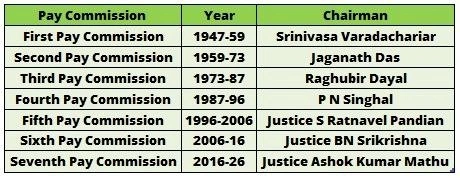Paper: GS – II, Subject: Polity, Topic: Institutions, Issue: Central Pay Commission.
Context:
India’s 8th Central Pay Commission continues the long-standing process of revising government salaries and pensions, balancing employee welfare with fiscal prudence.
Key Takeaways:
About Pay Commission:
- A body established by the Central Government to review and recommend changes to the salary, allowances, and pension structures of central government employees and pensioners.
- Established by: Department of Expenditure, Ministry of Finance, Government of India.
Aim: Ensure fair compensation for government employees.
- Recommend formulas for revising Dearness Allowance (DA) and Dearness Relief (DR) to offset inflation impacts
Functions:
- Review pays and allowances of central government employees.
- Suggest structural changes to enhance governance.
- Ensure financial sustainability of salary revisions

History of Pay Commissions:
- 1st Pay Commission, Year: 1946
- Headed by: Srinivasa Varadachariar
Seventh Pay Commission:
- Headed by Justice A.K. Mathur, it raised the minimum salary to ₹18,000 and pension to ₹9,000, adding ₹1 lakh crore to the fiscal 2016-17 expenditure during fiscal year 2016-17.
8th Pay Commission:
- It will likely propose formulas for revising the Dearness Allowance (DA) and Dearness Relief (DR) for employees and pensioners to counter inflation.
- The DA adjustment is based on the Consumer Price Index for Industrial Workers (CPI-IW), released monthly by the Labour Bureau, to track cost-of-living changes.
- The 8th Pay Commission aims to align government salaries with the rising cost of living, supporting employee welfare and economic growth.
What are the Different Terms of Reference?
- The Terms of Reference (TOR) of the pay commissions are finalized by the Union Cabinet. The TOR of the 8th CPC requires it to consider certain factors while making its recommendations. These include:
- Economic conditions of the country and the need for fiscal prudence.
- Need to ensure adequate resources for developmental expenditure and welfare measures.
- Unfunded cost of non-contributory pension schemes.
- Impact of recommendations on State government finances.
- Prevailing emolument structure and working conditions in central public sector undertakings and the private sector.
The 8th CPC must balance fiscal limits with modernising public sector pay. Key needs include performance-oriented structures, competitive senior salaries, better work conditions, and pension reforms to attract talent while maintaining long-term fiscal sustainability.
La Excellence IAS Academy, the best IAS coaching in Hyderabad, known for delivering quality content and conceptual clarity for UPSC 2025 preparation.
FOLLOW US ON:
◉ YouTube : https://www.youtube.com/@CivilsPrepTeam
◉ Facebook: https://www.facebook.com/LaExcellenceIAS
◉ Instagram: https://www.instagram.com/laexcellenceiasacademy/
GET IN TOUCH:
Contact us at info@laex.in, https://laex.in/contact-us/
or Call us @ +91 9052 29 2929, +91 9052 99 2929, +91 9154 24 2140
OUR BRANCHES:
Head Office: H No: 1-10-225A, Beside AEVA Fertility Center, Ashok Nagar Extension, VV Giri Nagar, Ashok Nagar, Hyderabad, 500020
Madhapur: Flat no: 301, survey no 58-60, Guttala begumpet Madhapur metro pillar: 1524, Rangareddy Hyderabad, Telangana 500081
Bangalore: Plot No: 99, 2nd floor, 80 Feet Road, Beside Poorvika Mobiles, Chandra Layout, Attiguppe, Near Vijaya Nagara, Bengaluru, 560040
